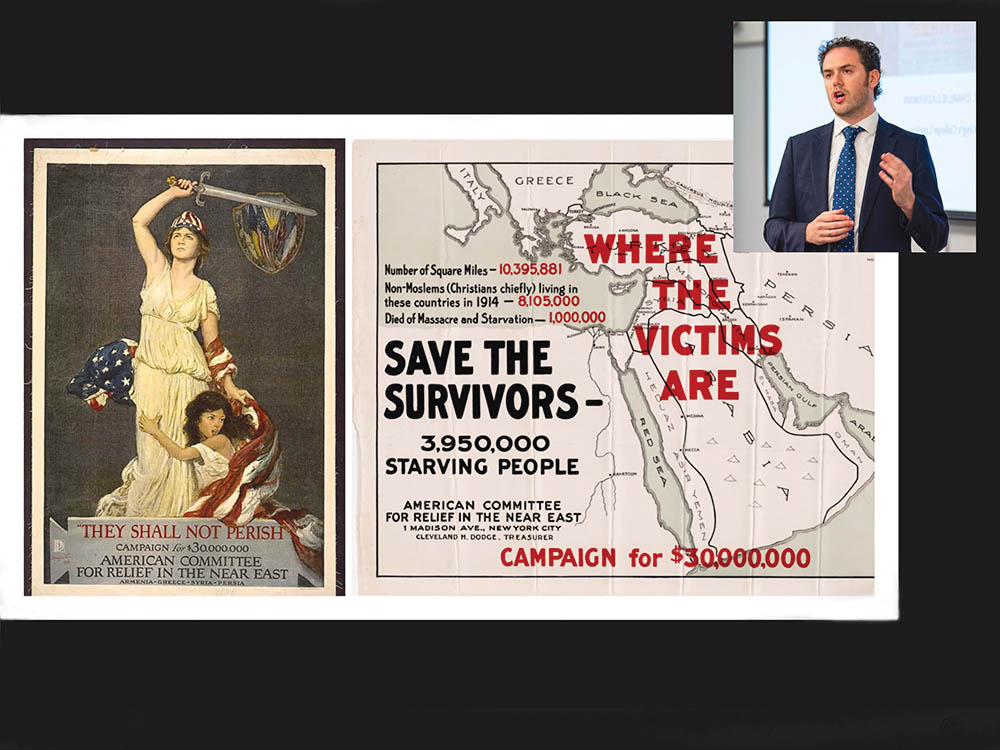
Sara Beberian
Staff Writer
“Who, after all, speaks today of the annihilation of the Armenians?” Armenians have been plagued by this haunting 1939 question from Adolf Hitler for many years. The Armenian Genocide is an open wound in the hearts of Armenians all around the world. Over 100 years later, Armenians still suffer from Turkey’s denial of their “crime against humanity,” and their continual threats to the existence of the Armenians. Armenians wonder why they are often left alone in spite of their desperate need for political mediation from other nations.
On Sunday, October 25, 2020, the Armenian Studies Program hosted an event titled “The Armenian Genocide and America’s Global Role.” The Zoom webinar featured guest speaker Dr. Charlie Laderman, lecturer in International History at King’s College in London. Ara Sarafian, founder of the Gomidas Institute in London, also joined the presentation to discuss Laderman’s book, Sharing the Burden: The Armenian Question, Humanitarian Intervention, and Anglo-American Visions of Global Order. Prof. Barlow Der Mugrdechian moderated the event and introduced the guests.
Dr. Laderman started the presentation by acknowledging the bipartisan resolution pas-sed by both the House of Representatives (H. Res 296) and the Senate (S. Res 150) in 2019, affirming the United States record on the Armenian Genocide. This resolution called the Armenian Genocide a “crime against civilization.” The resolution calls on the United States “to encourage education and public understanding of the facts of the Armenian Genocide, including the role of the United States in humanitarian relief efforts, and the relevance of the Armenian Genocide to modern-day crimes against humanity.”
Dr. Laderman went on to explain the American political climate in 1915, during World War I and the Armenian Genocide. He explained how the United States was well aware of the atrocities facing the Armenian people, and listed the multiple reasons why the United States government did not intervene on behalf of the Armenians.
President Woodrow Wilson’s reasoning for abandoning the Armenians was based on Wilson’s desire to have America stay neutral. He wanted to limit America’s international responsibility as well as to not militarily intervene in the Ottoman Empire. There was no political or economic advantage for American intervention on behalf of the Armenians.
President Theodore Roosevelt was often outspoken in his beliefs that intervention on behalf of the Armenians was completely justifiable, but was unwilling to do more than just speak about it. In his analysis of both Presidents Roosevelt and Wilson, Dr. Laderman came to two important conclusions regarding American policy making. First, he warned against political rhetoric that is detached from the reality of the situation. For example, speaking out against injustice but doing nothing to stop it. The second important conclusion was on the question of how far should a leader go to protect their own personal interests and America’s interests. In the case of the Armenians, was it worth it for Americans to send their troops and taxpayer’s money to Armenia when it did not directly benefit America?
Sarafian discussed several important aspects of Laderman’s work, noting how it tackles so many issues that plague the world of politics. There is a tragic, darker side of global politics that often goes undiscussed. One important note is something that lives fresh in the minds of Armenians around the world today. The little guys, in this case, the Armenians, often get lost in the world of politics. Armenian history is written in tragedy and this can be seen with the lack of American support for Armenians in 1915 as well as in 2020 with the recent war over Artsakh. Often times, politicians are so tied up in their own strategic interests, they forget their own humanity. Armenia provided no benefit for America, and Armenians suffered and continue to suffer all the more for it. It seems it is globally acceptable to turn a blind eye and to ignore international humanitarian standards when there is no economic benefit for intervention.
“Sharing the Burden successfully addresses challenges and debates that occurred in the past using the language of our time,” stated Sarafian.
The Armenian Genocide was the attempted destruction of a people, and there was bi-partisan agreement from the American government to not get involved. The book hauntingly echoes challenges that Armenians face today and is recommended by Sarafian to “all Armenians and all diplomats.”
Sharing the Burden can be purchased online through the website global.oup.com/academic, and the presentation can be viewed on the Armenian Studies Program YouTube channel.
 Hye Sharzhoom Armenian Action
Hye Sharzhoom Armenian Action